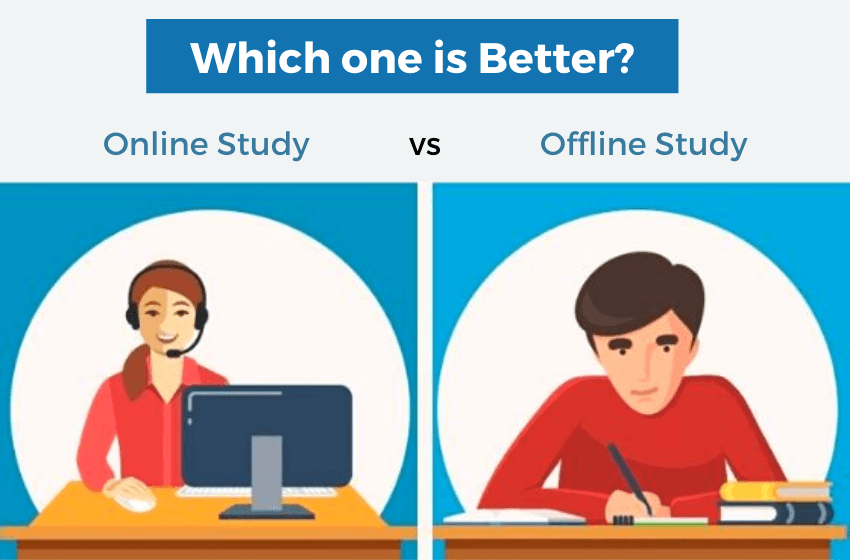Computer Science Degree Programmes - Online vs Offline Cost-Benefit Analysis
Updated: 5 May 2025, 5:21 pm IST
Online degree programs have gained massive popularity in recent years. As India heads towards a trillion-dollar digital economy, the country’s e-learning market is could reach $12.5 billion by 2027. The CAGR during the 2022-2027 forecast period is expected to be 13.9%.
Many traditional colleges and universities offer online courses in various subjects, including online computer science degree programs. Thus, the trend is not limited to just one field of study.
While many different computer science degree programs are available, one of the biggest decisions you'll need to make is whether to enroll in an online or offline program. Both options have their pros and cons. So, a cost-benefit analysis is essential to determine which option is best for you.
Let’s take a closer look at the benefits and downsides of online IT courses or computer science courses and their offline counterparts.
Start your learning journey with advice from our counselor

What is Online Education?
Online education, also known as e-learning, is a mode of education that utilizes the internet and digital technologies to deliver courses and training programs. With online education, students can access lectures, assignments, and other course materials from anywhere, at any time, and their own pace. Online education is available in various formats, including webinars, video tutorials, and live classes offered by universities and colleges.

Benefits of Opting for an Online Computer Science Degree Course
Opting for an online computer science course offers numerous benefits, from flexibility and cost savings to enhanced learning experiences and career advancement opportunities. This mode of education is particularly well-suited for the ever-evolving field of computer science, where staying current with the latest developments is crucial.
Affordability
One of the biggest benefits of an online computer science degree program is its affordability. Online programs are typically less expensive than offline ones, as they don't have overhead costs like building and maintenance expenses.
Flexibility
Many online programs allow flexibility when accessing study materials. Students can study at their own pace and on their own schedule. This can be beneficial for students working full-time or with other commitments, as it allows them to balance studies with other responsibilities.
Convenience
Another advantage of an online computer science degree program is convenience. With an online program, you can study from anywhere with an internet connection, making it easy to continue your education while travelling or working from home.
Range of Available Courses
Online programs often have a wider range of courses available, as there are no constraints of a physical classroom. This allows you to take courses that you wouldn't be able to take in an offline program and allows you to specialize in a particular area of computer science.

Drawbacks of an Online Computer Science Course
Online computer science courses have their share of disadvantages, including:
- Online computer courses can be more isolating than offline programs, as you won't have the same level of interaction with your peers and instructors.
- Online programs can be more challenging to navigate, as you'll need to be self-motivated and have good time management skills to succeed.
- Another potential drawback of online computer science courses is the limited access to resources such as libraries and laboratories. While online courses offer digital resources such as e-books and learning management systems, they cannot provide access to physical resources such as specialized computer science labs or libraries.

What is Offline Education?
Offline education is also known as traditional classroom-based learning. It is a mode of education that involves face-to-face interactions between students and teachers in a physical classroom.
With offline education, students attend lectures, participate in class discussions, and receive assignments from their teachers. Offline education allows students to interact with teachers and peers, access a wide range of resources such as libraries and laboratories, and engage in extracurricular activities.

Benefits of Opting for an Offline Computer Science Course
Opting for an offline computer science course provides a comprehensive learning experience that combines practical skills, direct interaction, and valuable networking opportunities. These benefits contribute to a well-rounded education and better prepare students for their future careers.
Structured Environment
Students learn from experienced instructors in a traditionally structured environment. This benefits students new to computer science, as it helps them develop a solid foundation in the field.
Teamwork and Collaboration
Offline computer science courses allow students to work collaboratively with their peers. The course structure often includes group projects and assignments, which can help students develop teamwork and communication skills crucial for professional success.
Working in groups also allows students to share knowledge and insights, which can improve their understanding of complex concepts.
Access to Physical Infrastructure
Unlike an online course, an offline computer science course on campus provides access to resources like high-end laboratories and libraries. Accessibility to such physical infrastructure enhances the overall learning experience of students.

Drawbacks of Opting for an Offline Computer Science Course
The drawbacks of opting for an offline computer science course include:
- Offline computer science programs can be more expensive than online programs, as they have to cover the costs of buildings, equipment, and other overhead expenses.
- Offline programs may not be as flexible as online programs. Students must attend classes at specific times and on specific days.
- Limited infrastructure and availability of instructors often result in offline programs not having the same level of course offerings as online ones.

Online Classes vs Offline Classes: Which One Should You Choose?
Choosing between online and offline classes is a decision that depends on various factors including learning style, schedule flexibility, and personal preferences. Both formats offer distinct advantages and potential drawbacks. Here's a detailed comparison to help you decide which one might be the best fit for you:
Accessibility
The ability to access online courses from anywhere in the world is one of their biggest benefits. Students can access learning materials from the convenience of their homes. Thus, online courses offer the unique advantage of location
flexibility
On the contrary, students have to travel to the location of the university or college for offline lessons. Online classes offer the convenience of studying from anywhere, allowing you to balance education with work or other commitments.
Technical Issues
Online classes face numerous technical issues. Access to suitable technological devices and overcoming technical limitations like a slow internet connection makes it difficult to watch videos online or take notes while attending live classes.
Technical glitches are less of a concern with offline classes. There is less dependence on technology since the interaction between students and teachers occurs in a physical classroom.
Mode of Education
Educators in online classrooms can access a broad range of online learning resources, including virtual whiteboards, audio, video, animations, and live student conversations. Augmented reality (AR) and virtual reality (VR) are also trending.
On the other hand, offline lessons provide students with effective hands-on learning inside an actual classroom. Students can interact closely with their professors, work in laboratories, and participate in real-time debates and discussions.
Time Management
Students who enroll in online courses struggle with time management. The lack of a fixed schedule may not motivate students enough to complete their courses on time.
On the other hand, students must adhere to a strict schedule in the case of offline courses. They must submit their assignments and projects on time due to the synchronous nature of the learning environment.
Are you ready to take the next step in your career ?
Conclusion
When deciding between an online or offline computer science degree program, conducting a thorough cost-benefit analysis is essential.
Ultimately, the decision comes down to the individual student's preferences, learning style, and long-term career goals.
If you are considering pursuing an online computer science degree, it is essential to weigh your options before making a decision. The online IT courses at Amity University Online are worth exploring.
By enrolling in an online computer course, you can receive a high-quality education from the comfort of your home while still enjoying the flexibility of online learning.
Tags : Latest









